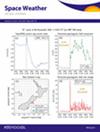Investigating the Interhemispheric Asymmetry in Joule Heating During the 2013 St. Patrick's Day Geomagnetic Storm
IF 3.7
2区 地球科学
引用次数: 0
Abstract
Sudden changes in energy input from the magnetosphere during geomagnetic storms could drive extreme variability in the ionosphere‐thermosphere system, which in turn affect satellite operations and other modern infrastructure. Joule heating is the main form of magnetospheric energy dissipation in the ionosphere‐thermosphere system, so it is important to know when and where Joule heating will occur. While Joule heating occurs all the time, it can increase rapidly during geomagnetic storms. We investigated the Joule heating profile of the 2013 St Patrick's day storm using the University of Michigan Global Ionosphere‐Thermosphere Model (GITM). Using empirical and data‐assimilated drivers we analyzed when and where intense Joule heating occurred. The timing, location, and sources of interhemispheric asymmetry during this geomagnetic storm are of key interest due to near equinox conditions. Hemispheric comparisons are made between parameters, including solar insolation, total electron content profiles, and Pedersen and Hall conductance profiles, obtained from GITM driven with empirical driven input, versus those driven with data‐assimilated patterns. Further comparisons are made during periods of peak hemispheric Joule heating asymmetry in an effort to investigate their potential sources. Additionally, we compare the consistency of the interhemispheric asymmetry between empirical‐ and data‐assimilated driven simulations to further analyze the role of data‐assimilated drivers on the IT system.研究2013年圣帕特里克日地磁风暴期间焦耳加热的半球不对称性
地磁风暴期间磁层能量输入的突然变化可能导致电离层-热层系统的极端变化,进而影响卫星运行和其他现代基础设施。焦耳加热是电离层-热层系统中磁层能量耗散的主要形式,因此了解焦耳加热发生的时间和地点是很重要的。虽然焦耳加热一直都在发生,但它在地磁风暴期间会迅速增加。我们利用密歇根大学全球电离层-热层模型(GITM)研究了2013年圣帕特里克日风暴的焦耳加热剖面。使用经验和数据同化的驱动程序,我们分析了何时何地发生强烈的焦耳加热。由于接近春分的条件,这次地磁风暴期间半球间不对称的时间、位置和来源是关键的兴趣。对由经验驱动输入的GITM与由数据同化模式驱动的GITM获得的参数进行了半球比较,包括太阳日照、总电子含量曲线、Pedersen和Hall电导曲线。在半球焦耳加热不对称的峰值期间进行了进一步的比较,以努力研究它们的潜在来源。此外,我们比较了经验驱动模拟和数据同化驱动模拟之间半球间不对称的一致性,以进一步分析数据同化驱动在IT系统中的作用。
本文章由计算机程序翻译,如有差异,请以英文原文为准。
求助全文
约1分钟内获得全文
求助全文

 求助内容:
求助内容: 应助结果提醒方式:
应助结果提醒方式:


